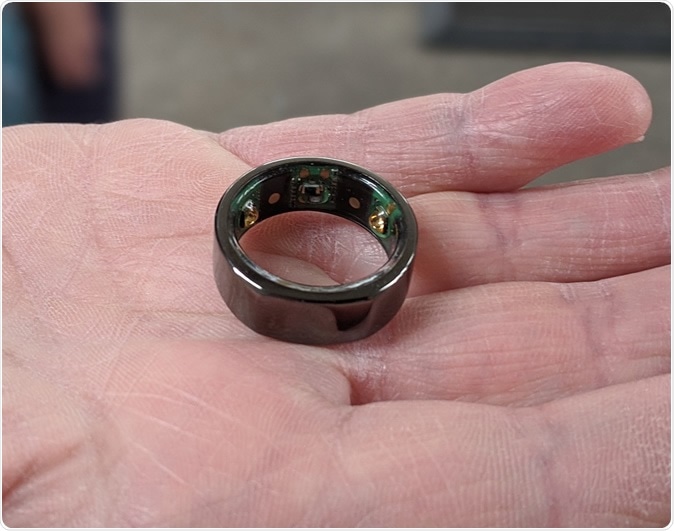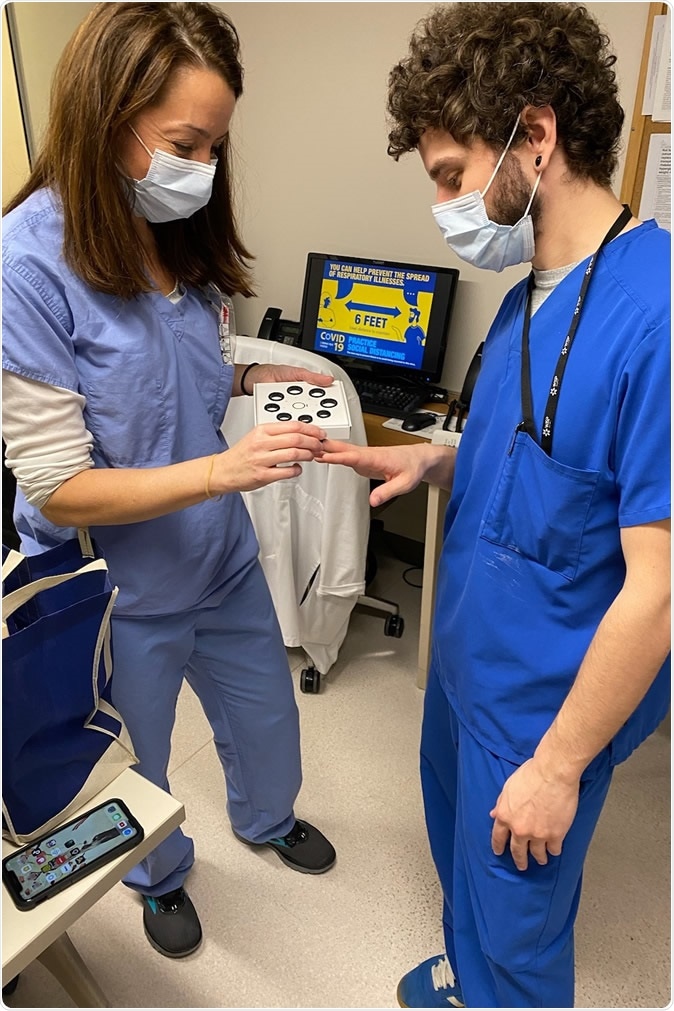As entire countries remain in lockdown due to the sweep of the novel coronavirus across the globe, researchers have found a way to protect those who are perhaps most at risk: healthcare workers.
One of the things which make the novel coronavirus so deadly is its so-called “incubation period.” This is the time after infection when an infected individual shows no symptoms at all, and so is indistinguishable from an uninfected person unless testing is done. This means that an individual can potentially spread the virus widely for up to two weeks. This fact is especially disturbing in the case of healthcare workers who are exposed to the infection on a daily basis.
Now, a new collaboration between healthcare product company Oura, West Virginia Rockefeller Neuroscience Institute, and WVU Medicine aims to present a remedy for this situation.

The Oura Ring tracker monitors an individual’s body temperature, breathing, heart rate and other vital signs.
What is the Oura ring?
One of the products which Oura makes is a wearable ring that monitors the pulse, temperature, heart rate variations, and sleep patterns. This is the key to this study. Even though COVID-19 is almost asymptomatic in the incubation period, it sometimes raises the patient’s temperature slightly. However, this is not reliable enough to use as a standalone test.

Leslie Crossley, registered nurse, sizes providers in the WVU Medicine J.W. Ruby Memorial Hospital Medical Intensive Care Unit for their Oura Rings.
The scientists, therefore, combined the data on temperature obtained by the Oura ring with physiological, cognitive, and behavioral information gathered from an app created by the R&D group. This provides a holistic overview of the wearer. According to RNI executive chair Ali Rezai, users have to fill out a five-minute questionnaire every morning through the company’s “gamified app,” which asks questions specific to COVID-19 detection. Then all this data is fed to a computer that uses an artificial intelligence (AI)-driven model to predict if the individual is infected and to forecast if they will develop fever, cough, tiredness, and other symptoms of viral infection.
The Intelligence behind the app comes from tens of thousands of user data samples from patients who have been tested for the virus via nasal swab.
RNI COVID Neuro Monitoring SPSvFINAL UltraHD
The advantage
Oura claims the AI model can currently identify whether frontline healthcare workers have the virus before they become symptomatic. This could be a breakthrough in monitoring and help limit the spread of the deadly virus. Rezai says that they can currently identify cases 24 hours before the first symptoms manifest, with 90% accuracy, and with more data, they are hopeful that they can stretch that gap by a day or two.
“The goal is to predict the onset of symptoms and identify frontline healthcare workers before they become symptomatic and limit the spread. This will help us get ahead of this pandemic; limit the spread, and improve our understanding of health recovery.”
There’s no doubt that the tech works: Rezai says he’s already able to track a clear correlation between temperature increase and the virus. Oura says they’ve received multiple reports from users who said the ring predicted flu or fever in the next two days, but they disregarded it, only to find themselves ill within 48 hours.
The evidence
The company has been running the smart rings and the smartphone app to monitor COVID-19 symptoms for the past three weeks by about a thousand healthcare workers. These individuals have to wear the ring and enter their cognitive and behavioral data into the app. Healthcare workers in hospitals in West Virginia, as well as Nashville, New York City, and Philadelphia, are taking part in this process.
Oura doesn’t typically do independent studies: Oura Health CEO Harpreet Rai says that “…what you’ll see with independent companies is you can pick and choose your data, and that ends up biased. So that’s why we think it’s important to partner with academics, to really make sure there’s a good scientific process in place.”
In turn, Rezai comments: “We have done extensive research in the wearable space, and Oura’s accuracy and usability are unparalleled to anything we have tested.”
The importance of surveillance
Some may feel there are privacy concerns that must be raised with this level of surveillance – and there are: it’s everyone’s duty to ensure responsible use of data. But what definitely takes a higher priority now in handling the virus – and that may require aggressive data collection and active, voluntary participants. Medical experts have already pointed out that in the absence of any vaccine or medical treatment, surveillance and quarantine have become the ‘go-to’ strategies to counter the spread of the virus.
Epidemiologist Simin Liu, who is an independent expert, says, “The idea of syndromic surveillance using wearable such as this one has been around for some time. To improve precision medicine and public health, we do need more work and data concerning the validity and cost-effectiveness of these new technologies.”
The company says, “If this approach is successful, it could open the door for research into tracking and managing other illnesses and conditions.” Liu agrees, calling active surveillance “the future” when such wearable monitors will be a way of life for those living in open societies.